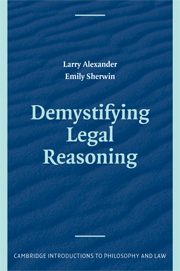PART TWO - Common-Law Reasoning: Deciding Cases When Prior Judicial Decisions Determine the Law
Published online by Cambridge University Press: 05 June 2012
Summary
We have assumed that even in an ideal community whose members share basic values and are disposed to act on them, settling controversies over specific applications of those values will be a high priority. Accordingly, the community will vest a power of settlement in chosen authorities. The community's primary lawmaking authorities, being unable to preside over every dispute that arises, will design and enforce general, serious rules.
In many cases, the primary authority's rules will prove sufficiently determinate to settle controversy without further official involvement. But this will not always be the case. Rules will require interpretation, a problem we take up in later chapters. Rules also will require enforcement: even if all actors within the community are disposed to act on the same values that animate the authorities' rules, some may be mistaken about what the rules require and others may believe that, in a given case, what the rule prescribes is wrong. Finally, the set of rules promulgated by lawmaking authorities will not provide answers to all questions that might arise in disputes. For all these reasons, the community, or the primary rule-making authority, will need to create adjudicative authorities – judges with power to apply rules and settle particular disputes.
It is possible to conceive of a legal system in which judges perform a purely adjudicative function. Judicial decisions would not be publicized and, consequently, would have no prospective effect.
- Type
- Chapter
- Information
- Demystifying Legal Reasoning , pp. 27 - 30Publisher: Cambridge University PressPrint publication year: 2008

